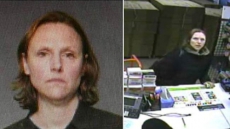Police in an Ontario community are reviewing their policy of requiring women to remove their bras while in custody, after coming under fire from a judge who admonished the force for the practice.
But as courts and critics decry the policy as discriminatory and even harmful, at least one other force in the country — Vancouver police — has a similar practice in place.
The issue recently came to the fore in the southwestern Ontario community of Chatham, where a judge highlighted the policy while tossing out an impaired driving case against a woman who had to remove her bra before a breathalyzer test in custody.
Chatham-Kent Police Chief Gary Conn has since explained that his force's bra-removal policy is based on safety concerns.
"In this particular case, our primary concern was safety and the taking of clothing which could be used as ligatures for self-harm or strangulation," Conn said in a statement.
"It appears that other police services within Ontario are assessing the removal of a bra for a person in custody on a 'case by case' basis. Based on this, we (CKPS) are comparing our policy/procedures to other services, keeping an open mind to the amendment of said policy/procedures to be more in line with other services."
The Chatham case isn't the first time a court has taken issue with a broad bra-removal policy — in 2013 a judge found York Regional Police violated a woman's rights with the practice, prompting the force north of Toronto to change its ways.
A number of other police forces, including those in Toronto, Halifax and Calgary, as well as Ontario Provincial Police, do not require all women in custody to remove their bras unless there is a case-specific safety concern.

Police in Vancouver, however, ask anyone arrested who is wearing a bra to remove the undergarment, citing safety concerns for the person and anyone else who is in custody.
"If that person refused, the bra would be removed by jail staff of the appropriate gender," said Sgt. Randy Fincham.
Blanket bra-removal practices need to be changed, said Kim Pate, executive director of the Canadian Association of Elizabeth Fry Societies, a group that advocates for the rights of women in the justice system.
"The logic of taking away a bra would be consistent with the logic of taking away underwear, and do they take away underwear, men's underwear and women's underwear as well? My sense would be not," Pate said. "Just a bra seems specifically focused on women."
If an officer is concerned that someone is truly self-injurious or suicidal, the safest approach is generally to try getting the person an assessment or sending them to an appropriate mental health facility, said Pate.
A policy that affects all women in custody, however, "makes no logical sense," and could actually do more harm than good, Pate said.
"If there's no evidence that harm is actually a risk then they actually are creating harm, potentially. Particularly if you're dealing with someone who might have a history of abuse, by insisting on having her remove her undergarments," she said. "That could very much trigger all kinds of post-traumatic or cause other response, anxiety, fear of police."
In the Chatham case, the force's police chief emphasized that his officers treated the woman "with the utmost dignity and respect," noting that a female officer was the one who directed her to take off her bra. The woman kept her sweater on after a search.
The woman's lawyer, however, said his client was "terrified and upset" by having to remove her undergarment.
"She doesn't go braless in public, she doesn't dress that way and that was totally foreign to her," said Brian Ducharme. "To intimidate someone by forcing them to remove their bra is uncalled for and I think this policy review is long overdue and the policy should be changed."

Chatham-Kent police noted that the force's policies around searching people in custody was approved by a Ministry of Community Safety and Correctional Services audit in 2011.
But a spokesman for the ministry said the policy that was audited did not specify the removal of a specific type of clothing, including undergarments.



